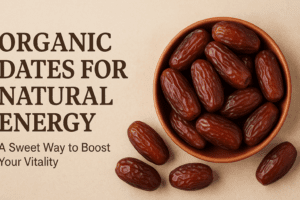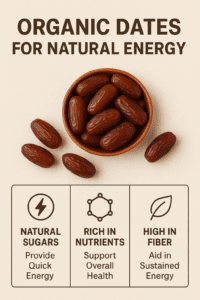In the modern world, maintaining energy throughout the day can feel like an uphill battle. Whether you’re a student burning the midnight oil, a working parent juggling a million tasks, or a fitness enthusiast looking for a pre-workout fuel, you’ve probably found yourself reaching for coffee, energy drinks, or processed snacks at some point.
But what if nature had already given us the perfect energy food? One that’s sweet, delicious, portable, and nutritionally rich?
Organic dates are one of the most effective natural sources of energy. They’re not just a traditional food eaten in desert regions or during religious festivals—they’re also a science-backed, nutrient-dense powerhouse that delivers long-lasting vitality.
This article dives deep into why organic dates are excellent for energy, how to incorporate them into your diet, and why you might want to make them a regular part of your daily routine.
What Are Organic Dates?
Dates are the fruit of the date palm tree (Phoenix dactylifera), typically grown in arid regions like the Middle East, North Africa, and parts of California. They have been consumed for thousands of years, not just for their sweetness, but also for their health-promoting properties.
Organic dates are cultivated without the use of synthetic pesticides, chemical fertilizers, or genetically modified organisms. That means they’re free from potentially harmful substances and richer in beneficial nutrients, antioxidants, and enzymes.
Unlike processed snacks that contain additives and artificial flavors, organic dates are whole foods. What you see is what you get—pure, sun-ripened fruit from nature.
Nutritional Profile of Organic Dates
Let’s take a closer look at what makes dates such an excellent source of energy. Here’s a breakdown of what 100 grams (about 4-6 large dates) provides:
-
Calories: 277
-
Carbohydrates: 75 grams
-
Natural Sugars: 66 grams
-
Fiber: 7 grams
-
Protein: 2 grams
-
Fat: 0.2 grams
-
Potassium: 656 mg (14% of daily value)
-
Magnesium: 54 mg (14% of daily value)
-
Iron: 0.9 mg
-
Vitamin B6: 0.2 mg
-
Copper, Manganese, Selenium: Trace but essential amounts
These nutrients work together to deliver clean, stable, and long-lasting energy. Let’s explore how.
Why Dates Are an Ideal Natural Energy Source
1. Quick-Release and Long-Lasting Energy
Organic dates are high in natural sugars—primarily glucose, fructose, and sucrose. These are rapidly absorbed by the body, making them perfect for a quick energy boost. However, because dates also contain fiber, they don’t cause the rapid blood sugar spikes and crashes that refined sugars do.
Instead, dates offer a balanced release of energy, giving you both an immediate lift and a longer-lasting endurance effect.
2. Fiber for Blood Sugar Regulation
The fiber in dates slows down digestion and moderates sugar absorption. This helps:
-
Maintain stable energy levels
-
Prevent hunger pangs
-
Improve digestive health
Consuming dates helps you feel full longer and reduces the temptation to reach for less healthy snacks.
3. Rich in Potassium and Magnesium
Potassium helps regulate muscle contractions and fluid balance—key factors in physical stamina and recovery. Magnesium, meanwhile, plays a crucial role in the production of ATP, the molecule that stores and delivers energy to your cells.
A magnesium deficiency can result in fatigue, muscle cramps, and poor sleep—all of which drain your energy.
4. Iron and Vitamin B6 for Oxygen and Metabolism
Iron is essential for transporting oxygen throughout your body. Without enough iron, your cells can’t get the oxygen they need to produce energy.
Vitamin B6 supports brain function and helps convert food into fuel. Combined with iron, it makes dates an excellent food for people suffering from fatigue or anemia.
Additional Health Benefits That Support Energy
Beyond directly providing energy, dates contribute to overall wellness, which further enhances your stamina and mental clarity.
-
Improves Sleep: Magnesium and B-vitamins help regulate melatonin and serotonin levels.
-
Boosts Immunity: Antioxidants like flavonoids and phenolic acid combat oxidative stress.
-
Reduces Inflammation: Chronic inflammation is an underlying cause of fatigue. The anti-inflammatory compounds in dates help reduce systemic stress.
A body in balance is a body with more sustainable energy throughout the day.
How and When to Eat Dates for Energy
Knowing when and how to eat dates can help you maximize their energy-boosting benefits.
Best Times to Eat Dates:
-
Morning: Kick-start your metabolism with 2–3 dates and a glass of warm water or herbal tea.
-
Pre-Workout: Eat 2–4 dates 30 minutes before exercise to power your session.
-
Afternoon Slump: Avoid sugary snacks or coffee. Grab 2 dates with a handful of almonds.
-
Post-Workout: Dates help replenish glycogen stores. Combine them with a protein source for recovery.
-
During Long Study or Work Sessions: A couple of dates help maintain mental focus and reduce brain fog.
How to Eat Dates:
-
Straight from the pack
-
Stuffed with almond or peanut butter
-
Chopped into oatmeal or yogurt
-
Blended into smoothies
-
As part of homemade energy bars or bites
-
As a natural sweetener in baking (using date paste)
Real-Life Use Cases
For Athletes
Organic dates are a favorite among endurance athletes. Cyclists, runners, and bodybuilders use them as pre-workout fuel and mid-training snacks due to their quick digestibility and carbohydrate content.
For Busy Professionals
Sitting at a desk for hours drains mental energy. A few dates in the afternoon can refresh your brain, stabilize blood sugar, and help you refocus.
For Pregnant Women
In the third trimester, dates have been shown to help with labor preparation. They’re also helpful for constipation and iron needs during pregnancy.
For Students
Rather than caffeinated drinks, students can snack on dates during study sessions. They improve concentration and supply clean energy to the brain.
Scientific Research and Studies
Dates have been studied extensively for their health benefits:
-
A study in the International Journal of Food Sciences and Nutrition highlighted dates’ rich nutrient profile and antioxidant properties.
-
Research in Journal of Sports Science and Medicine found that dates improve exercise performance and reduce fatigue in athletes.
-
A clinical study published in Nutrients (2020) emphasized that dates help regulate blood sugar and insulin response due to their fiber content and low glycemic index.
These findings confirm that dates are a functional food—meaning they provide both nutrition and therapeutic benefits.
Organic vs. Conventional Dates: Why It Matters
Not all dates are created equal. Conventional dates are often treated with sulfites to preserve color and shelf life. They may also be exposed to pesticides and sprayed with sugar syrup to enhance sweetness.
Organic dates avoid all of that. They are:
-
Grown in chemical-free environments
-
Harvested and dried without preservatives
-
Richer in natural flavor
-
Better for the environment and your health
Always check the label to ensure you’re buying certified organic, additive-free dates.
Storage and Shelf Life
Dates are naturally dehydrated, so they last a long time without refrigeration. However, to preserve texture and nutrients:
-
Store in an airtight container
-
Keep in a cool, dry place
-
Refrigerate for longer shelf life (up to 6–12 months)
-
Freeze for even longer storage without compromising quality
Potential Downsides: What to Watch Out For
While dates are healthy, they are also calorie-dense due to their sugar content. Overconsumption can lead to weight gain or affect blood sugar if not balanced with other foods.
General guidelines:
-
2–3 dates per day for sedentary individuals
-
Up to 5–6 dates for active people
-
Pair with protein or fat (like nuts) to slow sugar absorption
People with diabetes should consult their doctor or nutritionist before adding dates to their diet.
Buyer’s Guide: What to Look For
When purchasing organic dates:
-
Look for “certified organic” labels
-
Avoid dates with added sugar or preservatives
-
Choose plump, slightly soft, and glossy fruits
-
Buy from trusted brands or direct from organic farms
Popular types:
-
Medjool: Large, juicy, sweet
-
Deglet Noor: Firmer, smaller, milder in taste
Final Thoughts
Organic dates are a simple, effective, and natural way to boost your energy. They combine the benefits of natural sugars, fiber, and essential nutrients into one convenient, portable fruit.
Unlike energy drinks or artificial snacks, dates offer a balanced energy source that supports both the mind and body. Whether you’re powering through a workout, tackling a long day of meetings, or staying up late to study, a few organic dates can make a significant difference in how you feel and perform.
Choosing dates as your go-to energy booster is not only a healthy decision—it’s a timeless one backed by centuries of use and modern science.

